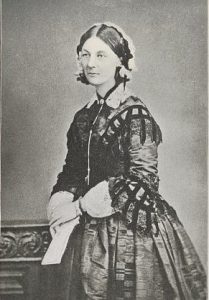What Does it Mean to be a Professional?
Tamara Berghout
Learning Objectives
In this unit, learners will:
- Examine foundational professional nursing documents.
- Describe professional behaviors and how they influence nurses and the profession of nursing.
When you became a nurse, you may have thought ‘professionalism’ meant wearing a uniform and providing excellent and knowledgeable patient care. However, with more experience, you probably realize that professionalism means more than this. So, what does it mean to be a ‘professional’ for a nurse/APRN with a doctorate in leadership?

To begin this unit, please watch the following video: [1]:
The Merriam-Webster Dictionary[2] (n.d.) defines professionalism as “the conduct, aims, or qualities that characterize or mark a profession or a professional person.” Buhai [3] suggested the following characteristics help to define a profession:
- Specialized training/education
- Autonomy of practice
- Ethical conduct
- Expert knowledge
- Trustworthiness
- Self-regulation
- Continuing education
- Service to society
In addition, Yoder [4] identified the following characteristics of professionalism specific to nursing:
- Altruism, or acting in the patients/family’s best interest
- Demonstrating compassion, humility, empathy, and caring
- Having high standards of competence, behavior, and knowledge
- High ethical conduct, including integrity, accountability, honor, and a sense of duty
- Acknowledgement of a responsibility to society in general
- Cultural sensitively and competence
Guides for Professional Nurses

As the nursing profession has matured, many have tried to elaborate on what is expected of nurses. As a result, several important documents have been created to help nurses understand what it means to be a professional. These documents are intended to inform nurses’ thinking, decision-making, and behaviors, and strengthen the profession. Although there are many guiding documents for nurses, this chapter will focus on a few of the major ones that help to illustrate professionalism and nursing for leaders.
Essentials for Professional Nursing Education
The American Association of Colleges of Nursing (AACN) is an organization that focuses on nursing educational standards. In their landmark Essentials for Professional Nursing Education document, AACN[5] said nursing professionals must embrace the values of:
- Integrity
- Altruism
- Inclusivity
- Compassion
- Courage
- Humility
- Advocacy
- Caring
- Autonomy
- Humanity
- Social Justice
See more on the AACN Nursing Essentials at this website https://www.aacnnursing.org/Essentials/Domains
The American Nurses Association
The American Nurses Association (ANA) has also developed several foundational documents to define nursing for society and help guide nurses. In addition, the ANA has identified behaviors they believe professional nurses should embody through these documents. These documents include the ANA Code of Ethics for Nurses [6], the Nursing: Scope and standards of practice [7], and Nursing’s Social Policy Statement: The Essence of the Profession [8].
A Code of Ethics for Nurses
The ANA Code of Ethics for Nurses is an important behavioral guide that all nurses should be familiar with. The first Code of Ethics for nurses was written in 1893 as a pledge similar to the Hippocratic Oath and is now a living document that continually evolves with the changing social context of nursing [9]. This valuable document identifies nine overarching ethical provisions to guide nurses in their decision-making. The provisions focus on:
- The need to build positive relationships
- Commitment to the patient
- Advocacy
- Accountability
- Supporting the nurse’s personal safety and growth
- Moral and ethical obligations
- The need to contribute to the profession
- The need to fight for social justice
See more about the ANA Code of Ethics for Nurses at this website at https://www.nursingworld.org/practice-policy/nursing-excellence/ethics/code-of-ethics-for-nurses/)
Standards of Professional Performance

The ANA’s Nursing: Scope and Standards of Practice[10] document has identified eleven standards of professional performance for nurses. The ANA describes the expected behaviors of the professional registered nurse, depending on role, position, and level of education. It is important to understand that some of the standards may not apply to patient care. This standard describes professional behaviors using the following terms:
- Ethical conduct
- Engagement in advocacy
- Humility, inclusiveness
- Effective communication and collaboration
- Leadership & mentoring
- Continual learning and improvement
- Creating and using evidence to improve the quality of healthcare
- Self-awareness and the ability to self-evaluate
See more about the ANA’s Nursing: Scope and Standards of Practice Standards at https://www.nursingworld.org/~4af71a/globalassets/catalog/book-toc/nssp3e-sample-chapter.pdf
Nursing’s Social Policy Statement: The Essence of the Profession
One important characteristic of professional nurses is their responsibility to society. The ANA’s Nursing Social Policy statement[11] describes the value of the nursing profession within society, defines the concept of nursing, and reviews the regulations and standards of nursing practice. Nursing practice is inherently connected to society, thus requiring a social contract between society and the profession . Society permits the nursing profession to work autonomously to meet the needs of society. In return, nursing is expected to provide healthcare services while maintaining the public’s trust. This statement describes the contract that nurses have with society using terms such as:
- Caring service
- Priority for the patient
- Knowledge
- Skills
- Competence
- Responsibility
- Accountability
- Progress and development
- Ethical practice
- Collaboration
- Promotion of public health
See more about the ANA’s Nursing Social Policy Statement at https://www.nursingworld.org/~4af892/globalassets/catalog/sample-chapters/guide-to-nursings-social-policy-statement.pdf
Accountability to the Nursing Profession and Society

Although most of these statements clarify what nursing’s responsibility is to society, it is perhaps not as clear that nurses also have a responsibility to themselves and their profession. Just as nurses are advocates for their patients, they must also be strong advocates for themselves, nurses and the nursing profession. To do this, nurses must work collaboratively to formulate the profession’s scope, standards of care, licensing, entry into practice, and more. Nurses must also play an important role in shaping their profession by engaging in the formulation of policies and laws. Nurses and nurse leaders, in particular, are responsible for understanding the policy development process and the best ways to influence change so they can use that knowledge to advocate for themselves, their patients, and their profession.
Nurses can also demonstrate their accountability to their profession and society through participation in organization-sponsored conferences and activities. Through participation in professional nursing organizations, nurses use the power in numbers to promote safe, quality nursing care, improved nursing autonomy, nurses’ rights, and more. Nurses can also support their profession through service within nursing organizations and their engagement in creating and using evidence to improve both practice and patient outcomes. It is essential for nurses to support professional organizations as a way to be accountable to the nursing profession [12].[13]
Exercise
Media Attributions
- florence nightingale © Library of Congress is licensed under a Public Domain license
- compass-the-directions-of-the-world-wallpaper-preview © Unknown is licensed under a CC0 (Creative Commons Zero) license
- Stethoscope © Unknown is licensed under a CC0 (Creative Commons Zero) license
- accountibility to society oer © geralt is licensed under a CC0 (Creative Commons Zero) license
- Bolton University. Professionalism. YouTube. (n.d.). https://youtu.be/S703WyqaGn4?si=cdA7QBD8PheEpfqJ ↵
- Merriam-Webster. (n.d.). Merriam-Webster.com dictionary. Retrieved March 16, 2023, from https://www.merriam-webster.com ↵
- Buhai, S. L. (2012). Profession: a definition. Fordham Urban Law Journal, 40(1), 241+. https://link.gale.com/apps/doc/A332022265/ITOF?u=ogde72764&sid=summon&xid=865b0b33 ↵
- Yoder, L. (2017). Professionalism in nursing. (AMSN president’s message). Medsurg Nursing, 26(5), 293-294. From https://link.gale.com/apps/doc/A514512706/AONE?u=ogde72764&sid=googleScholar&xid= bcc83fe1 ↵
- American Association of Colleges of Nursing. The essentials: Core competencies for professional nursing education. ↵
- American Nurses Association. (2015). Code of ethics for nurses with interpretive statements. https://www.nursingworld.org ↵
- American Nurses Association. (2015). Scope and standards of practice (3rd ed.). https://www.nursingworld.org/ ↵
- American Nurses Association. (2021). Nursing’s Social Policy Statement: The Essence of the Profession. https://www.nursingworld.org ↵
- ANA Code of Ethics for Nurses (2015)[footnote]American Nurses Association. (2015). Code of ethics for nurses with interpretive statements. https://www.nursingworld.org ↵
- Nursing: Scope and standards of practice [footnote]American Nurses Association. (2015). Scope and standards of practice (3rd ed.). https://www.nursingworld.org/ ↵
- merican Nurses Association. (2021). Nursing’s Social Policy Statement: The Essence of the Profession. https://www.nursingworld.org ↵
- Battie, R., & Steelman, V. M. (2015). Accountability in nursing practice: Why it is important for patient safety. ACORN (O’Halloran Hill, S. Aust.), 28(4), 14-16. http://www.acorn.org.au/ ↵
- Derivative of: Murphy, J. (2020). Transitions to Professional Nursing Practice. SUNY Delhi. https://courses.lumenlearning.com/suny-delhi-professionalnursing. CC BY: Attribution ↵

